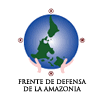Chevron Draws Fire from U.S. Council of Bishops, Sierra Club over Improper Ecuador Lobbying
Oil Giant's Campaign to Cancel Ecuador's Trade Preferences Derailed for Fifth Straight Year

Amazon Defense Coalition
8 July 2010 - FOR IMMEDIATE RELEASE
Contact: Karen Hinton at +1.703.798.3109
Supporting Documents:
Washington, DC – Chevron's lobbying campaign to cancel Ecuador's trade preferences over a $27 billion environmental lawsuit brought by indigenous groups appears headed for failure yet again.
Last week, the office of the United States Trade Representative submitted a report to Congress that flatly ignored Chevron's attempt to have Ecuador's trade preferences canceled. It was the fifth consecutive year the oil giant had engaged the USTR on the issue and failed to achieve its objective. Each time, Chevron used heavyweights such as former Clinton Administration officials Mickey Kantor and Mac McLarty and Republican super-lobbyist Wayne Berman to carry its message.
Chevron's lobbying of the USTR, called an "attack on the rule of law" by the indigenous leaders, recently was criticized either implicitly or expressly by the U.S. Conference of Catholic Bishops, the Sierra Club, and numerous Congressmen. All wrote letters to USTR Ambassador Ron Kirk urging that his office reject Chevron's proposal, which would have cost Ecuador 350,000 jobs had it been accepted.
Chevron's lobbying also had been criticized by the Los Angeles Times, which editorialized that "halting the [Ecuador] trade agreement at Chevron's behest would harm broader U.S. interests."
The lawsuit, which is being tried in Ecuador at Chevron's request, accuses the oil giant of deliberately discharging more than 18 billion gallons of toxic waste into Amazon forests and waterways when it operated a large oil concession from 1964 to 1990. Six indigenous groups have had their traditional lifestyles decimated and more than 1,400 people have died of cancer due to Chevron's sub-standard practices, according to the lawsuit.
The amount of oil discharged by Chevron in Ecuador is far greater in quantity that the amount spilled in the BP disaster in the Gulf of Mexico, according to the plaintiffs. The damages claim against Chevron in Ecuador is $27.3 billion.
The letter from the Conference of Catholic Bishops, sent June 23 to Kirk, urged the Obama Administration "to resist direct or indirect interference in any legal processes Ecuador or its citizens may have initiated to assert their right to defend their environment and the health of their people."
Most Reverend Howard Hubbard, writing for the Bishops, also expressed concern over efforts to "misuse" trade policy to "punish the very people trade preferences are intended to help when people try to defend the environment and human rights."
In its letter, the Sierra Club wrote in reference to Chevron that trade "preferences were not intended to be, and should not be, used as a means of pressuring any government to foreclose the constitutional rights of its citizens who seek to use the legal system to protect and restore the natural world."
"This is especially true when our government is being asked to do so by, and for the economic benefit of, a powerful corporation that does not contest the central fact of pollution on a vast scale at issue in the case, only its own liability," said the letter, signed by Executive Director Michael Brune.
With 1.3 million members and supporters, the Sierra Club is the oldest and largest grassroots environmental organization in the United States. Both the Sierra Club and the U.S. Conference of Catholic Bishops are considered highly influential in Washington lobbying circles.
For years, the USTR – under both the Bush and Obama Administrations – has snubbed Chevron over its Ecuador lobbying. Last year, 26 members of Congress, including several powerful senior members, urged the USTR to reject Chevron's effort to use trade agreements "as leverage to interfere in private claims progressing through Ecuador's legal process."
In 2006, then-Senator Obama and Sen. Patrick Leahy (D-VT) also wrote a letter to the USTR urging it to reject Chevron's lobbying and to steer clear of the private legal dispute in Ecuador.
The lawsuit, originally filed by 30,000 Ecuadorians in New York in 1993, was transferred to Ecuador after Chevron filed 14 sworn affidavits to the U.S. court praising the fairness of that country's court system. Shortly after the trial in Ecuador began in 2003 and the evidence pointed to Chevron's culpability, the company started to attack the courts it had previously praised and initiated the lobbying campaign over trade preferences.
The USTR report is only a recommendation to the Congress, which must decide by the end of the year whether Ecuador's trade preferences will be extended. Like the USTR, for several years running Congress has rejected Chevron's request over Ecuador's trade preferences.